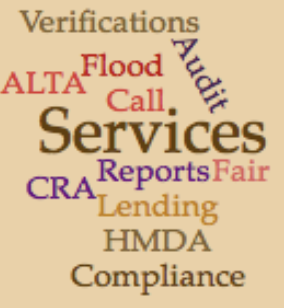-
 The Rise of AI in Mortgage Origination: Driving Efficiency and Accuracy
The Rise of AI in Mortgage Origination: Driving Efficiency and Accuracy Discover how AI is transforming mortgage origination by improving efficiency, accuracy, and customer satisfaction. Explore key trends and real-life examples in this insightful article.
Discover how AI is transforming mortgage origination by improving efficiency, accuracy, and customer satisfaction. Explore key trends and real-life examples in this insightful article.
QuestSoft Adds ALTA Registry to Subscription Services Offered Through Compliance EAGLE
- Friday, 15 March 2019
- Lending

QuestSoft Corporation announced it has added the ALTA Registry check to its growing list of Compliance EAGLE subscription services. The ALTA Registry functions as a searchable online database of underwriter-confirmed title agent companies, real estate attorneys and underwriter direct offices.
“The ALTA Registry identifies a title vendor with unprecedented accuracy and is a great fit for real-time mortgage compliance,” says Leonard Ryan, President of QuestSoft. “This makes our results more accurate and further automates the range of verification checks Compliance EAGLE provides lenders. The ALTA Registry includes a unique ID that allows us and our lender customers to identify a title vendor without relying upon antiquated processes while at the same time solving decades old verification headaches.”
[adbutler zone_id="326314"]
[adbutler zone_id="326316"]
Because there had previously been no unique ID number used across the industry to help match provider records in different databases, communication has often been difficult and costly for the title industry and its customers. This challenge can also impact compliance and vendor oversight requirements as well as the need for collaboration throughout the transaction. The ALTA Registry addresses this by creating a unique 7-digit identifier -- the ALTA ID -- which is automatically assigned to each new database record as a permanent ID number and is never changed, reassigned, or reused.
Compliance EAGLE is the only digital compliance & risk management platform allowing mortgage lenders to check regulatory red-flags prior to funding. This includes Instant HMDA, Instant MCR, Flood PreCert, Secondary Market Saleability Review, LEF Review and Exclusionary List checks. Adding the ALTA Database brings another level of assurance to lenders.
“Compliance EAGLE relies upon good, clean data to provide lenders with pre-closing checks on TILA, QM, RESPA, exclusionary list, fraud reviews and other critical regulations,” added Ryan. “The ALTA Registry enhances this by ensuring that a title vendor's title insurance underwriters have confirmed their individual information before it is published in the ALTA Registry.”
Read more...Navy Federal Deploys Mortgage-Backed Securities Platform
- Tuesday, 12 March 2019
- Lending

Navy Federal Credit Union, the largest retail credit union with over $97 billion in assets, has deployed Broadridge Financial Solutions' Mortgage-Backed Securities Expert SaaS platform.
It’s a mortgage-backed securities processing solution that is engineered to give its users a competitive advantage in this multi-trillion-dollar market. Navy Federal is the first credit union that has been brought live on Broadridge platform.
The platform provides advanced functional capabilities to support front, middle- and back- office operations. MBS Expert integrates with a client's existing electronic trading platform and front- and back-office infrastructure, diminishing client start-up costs. The technology is used by more than 30 of the largest Fixed Income Clearing Corporation clearing members and asset managers.
"MBS Expert was the right choice to support our expanding business needs, and we have transacted over $2 billion worth of MBS trading leveraging MBS Expert," said William Tabri, manager of capital markets at Navy Federal Credit Union. "Navy Federal is now a full-clearing member of the FICC's MBS Division, availing us of the entire range of MBS-related services. Aside from leveraging the new relationships with other FICC member firms, we will benefit from decreased counterparty risk and a centralized margining process through the FICC."
"Broadridge's delivery of MBS Expert minimizes the time to market and expense typically associated with implementing MBS processing solutions, enabling Navy Federal to maximize its return on investment and better focus operating and staffing resources on core business functions," said Vijay Mayadas, president of global fixed income at Broadridge.
Read more...CFPB Report: Some Servicers’ Late Fees Run Amok of Regs
- Tuesday, 12 March 2019
- Lending

The Consumer Financial Protection Bureau examinations determined that mortgage servicers charged borrowers late fees greater than the amount permitted by their mortgage notes.
To be sure, examiners identified several types of affected mortgage notes. For example, certain Federal Housing Authority mortgage notes permit servicers to collect late fees in the amount of 4 percent of the overdue principal and interest, according to the “Supervisory Highlights Issue 18, Winter 2019” from the CFPB. In practice, however, servicers charged late fees that included taxes and insurance, not just principal and interest.
Provisions that limit the amount of late fees, weren’t adhered to. For example, certain West Virginia mortgage notes permit servicers to collect “5 percent of that portion of the installment of principal and interest that is overdue, but not more than $15.”
[adbutler zone_id="326314"]
[adbutler zone_id="326316"]
Nonetheless, on large numbers of loans, the servicer charged a late fee greater than that amount. Programming errors in the servicing platform and lapses in service-provider oversight caused the overcharges.
As a result, thousands of borrowers paid more than was required, making the aggregate injury substantial. The fees could not be avoided since the servicer automatically imposed the late fees. In response to the findings of the CFPB, servicers conducted a review to identify and remediate affected borrowers. Also, they changed policies and procedures to ensure the amount of late fees that were charged were authorized by the mortgage note.
In addition, the CFPB found a pattern of misrepresenting private mortgage insurance cancellation reasons. The Homeowners Protection Act requires servicers to cancel private mortgage insurance in connection with a residential mortgage transaction if certain conditions are met as follows:
Among other conditions, the borrower has to request the cancellation in writing, and the principal balance of the mortgage must have reached 80 percent of the original loan to value of the property based solely on actual payments. Or reached the date on which it was first scheduled to fall to 80 percent of the original value of the property, based solely on the amortization schedule in effect at a particular point in time depending on the loan type--regardless of the outstanding balance.
According to the CFPB, that’s not what happened.
Borrowers who verbally requested PMI cancellation were informed that they were declined because they had not reached 80 percent loan to value. Although the relevant amortization schedules did not yet provide for 80 percent loan to value, examiners found that these borrowers had in fact reached that threshold--based on actual payments because they had made extra principal payments.
Although the borrowers did not satisfy other criteria necessary to trigger borrower initiated cancellation rights under the HPA, such as certifying that the property is unencumbered by subordinate liens or submitting the requests in writing, those reasons weren’t communicated to borrowers to explain denials.
To be sure, communications from servicers misled consumers about whether and when the HPA entitled them to request that the servicer cancel PMI, and about the actual reasons the borrowers were not eligible for PMI cancellation.
It would be reasonable for consumers to believe that they were not eligible for PMI cancellation for the reasons stated in the letters because most consumers would not have a basis to question the misrepresentations, according to the CFPB report. A consumer might think that she had miscalculated payments such that she had not yet reached 80 percent LTV or had misunderstood some other aspect of meeting the LTV requirement.
Last, the servicers’ misrepresentations were material because they were likely to affect a borrower’s choice as to whether to continue to request PMI cancellation, including whether to address the actual, uncommunicated reasons for ineligibility. For instance, borrowers receiving the incorrect denial reason may fail to address other eligibility requirements to obtain a cancellation.
They might be discouraged from requesting PMI cancellation in some circumstances in which federal law, or the servicer’s policies, would give them a right to cancel PMI. In response to examiners’ findings, servicers have changed their templates, as well as policies and procedures, to ensure that PMI cancellation notices state accurate denial reasons.
Read more...
First United Reports Net Income of $10.7M for 2018
- Sunday, 10 March 2019
- Lending

First United Corp. reported consolidated net income available was $10.7 million for the year ended Dec. 31, 2018, compared to $4.1 million for 2017. First United is a holding company and the parent company of First United Bank & Trust.
Basic and diluted net income per common share for the year ended Dec. 31, 2018 were $1.51, compared to $0.58 in 2017. The increase in earnings for 2018 was attributable to a $4.6 million increase in net-interest income, an increase of $0.7 million in other operating income, exclusive of gains, a $0.4 million decrease in provision expense, and a $4.2 million decrease in income-tax expense
"During 2018 we delivered improved core earnings, a higher net interest margin, and enhanced earnings per common share,” said Carissa Rodeheaver, chairman, president and CEO. “We were pleased to have positive loan growth, resulting in growth in our total assets. In 2019, we will continue our focus on growing our loan portfolio, growing core deposits, increasing fee income and becoming a more efficient organization."
[adbutler zone_id="326314"]
[adbutler zone_id="326316"]
Comparing Dec. 31, 2018 to Dec. 31, 2017, loans outstanding increased by $115.2 million. Commercial real-estate loans increased by $23.7 million due to several new clients in 2018.
Residential mortgage loans increased $38.3 million due to the purchase of a $15 million mortgage pool in the first quarter of 2018 as well as production in the professional's program. Growth occurred in both fixed and adjustable products.
At Dec. 31, 2018 and 2017, 27% and 28%, respectively, of the commercial loan portfolio was collateralized by real estate.
Adjustable interest rate loans made up 52% of loans at Dec. 31, 2018 and 58% at Dec. 31, 2017, with the balance being fixed–interest rate loans as customer preference shifted to fixed-rate products in the rising-rate environment. Residential mortgage loans had a net charge-off ratio of 0.01% at Dec. 31, 2018, compared to a net recovery ratio of 0.01% as of Dec. 31, 2017, and the consumer loan charge-off ratios were 0.95% and 0.53% for Dec. 31, 2018 and Dec. 31, 2017, respectively.
Read more...








